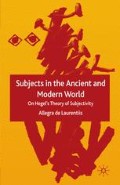Abstract
One aspect of Hegel’s appraisal of ancient philosophy is directly linked to his interpretation of Greek antiquity as being pervasively involved in an epoch-defining struggle against incipient developments of individual or particular independence (‘the independent development of particularity’),1 that is, against tentative expressions of subjective freedom. According to Hegel‘s view, the struggle ends with the ancient world’s succumbing to its foe, namely ‘free infinite personhood,’2 the same principle that will then provide ‘the pivot on which the.… impending world revolution turned.’3 For example, in the Greater Logic, the Philosophy of Right, and the Lectures on ancient philosophy, Plato’s ethical dialogues are repeatedly presented as attempts to counter the legitimacy of particular subjective views, motives and actions on the grounds that they must threaten the harmony (or justice) of the kallipolis’ true ethical life.
Access this chapter
Tax calculation will be finalised at checkout
Purchases are for personal use only
Preview
Unable to display preview. Download preview PDF.
Notes
For a concise account of the formulations and their attributions see G. Vlastos, ‘A Note on Zeno’s Arrow’, Phronesis, XI:I (1966) 3–18, especially notes 1, 2 and 3. A detailed account is in M. Untersteiner, Zenone. Testimonianze e frammenti (Firenze: Nuova Italia, 1963).
See Diogenes Laertius, Leben und Meinungen beruehmter Philosophen, book four, chapter 2. K. Reich, ed (Hamburg: Meiner, 1967), p. 313.
Physics 239 b 5. In the following I use the translation by R.P. Hardie and R.K. Gaye in J. Barnes ed. (1984). On occasion, comparison with the Greek text prompts me to prefer the translation by P.H. Wicksteed and KM. Cornford, Aristotle. The Physics (Cambridge: Harvard University Press, 1968) vols I and II.
M. Wolff, Der Begriff des Widerspruchs. Eine Studie zur Dialektik Kants und Hegels (Koenigstein: Hain-Athenaeum, 1981) gives the elegant mathematical explanation of the difference between ‘rest’ and ‘lack of movement’ (an explanation already used in Vlastos 1966) that lies at the core of the Kantian passages discussed. Both Vlastos and Wolff point out that if velocity is a ratio between space and time (v = s/t), then a body can only be at rest (v = 0) if it does not traverse any space (s = 0) during a positive period of time (t > 0). If the time parameter were null as well, the mathematical ratio would become an irrational number (v = 0/0 = i), which does not describe a body at rest (but rather perhaps, as anticipated by Aristotle in Physics 239 b, the non-existence of the body altogether).
I. Duering (Aristoteles. Darstellung und Interpretation seines Denkens, (Heidelberg 1966, p. 326) shares Hegel’s interpretation: ‘Of course it was not Zeno’s intention to prove that Achilles would never overtake the turtle. Contemporary mathematics allowed him certainly to calculate exactly when this would take place. What he did want to demonstrate was merely that in his view the concept of motion is full of contradictions.’
Copyright information
© 2005 Allegra de Laurentiis
About this chapter
Cite this chapter
de Laurentiis, A. (2005). Dialectic Matters: Starting Out with Simple Motion. In: Subjects in the Ancient and Modern World. Palgrave Macmillan, London. https://doi.org/10.1057/9780230509443_7
Download citation
DOI: https://doi.org/10.1057/9780230509443_7
Publisher Name: Palgrave Macmillan, London
Print ISBN: 978-1-349-51929-3
Online ISBN: 978-0-230-50944-3
eBook Packages: Palgrave Religion & Philosophy CollectionPhilosophy and Religion (R0)

